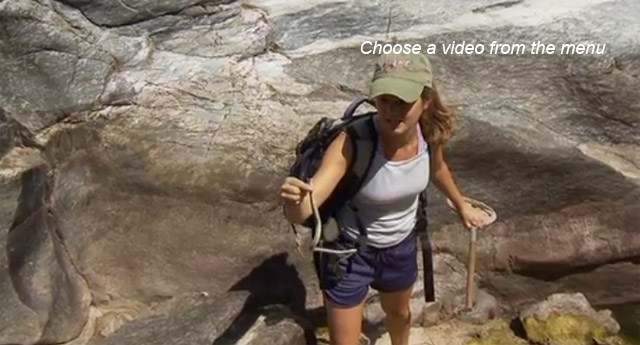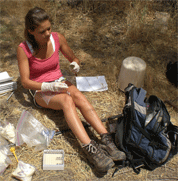Anna Savage
Hunting for the invisible killer: How do genes determine susceptibility of frogs to a deadly fungus

Other Resources
Anna's Profile

1. What is the focus of your research?
I study the fungal disease chytridiomycosis and its effects on the lowland leopard frog (Lithobates yavapaiensis), an amphibian that occurs in the southwestern United States and Mexico. The focus of my research is to examine the immune system genes of frogs from twelve different populations throughout the state of Arizona. By examining the different alleles of these genes – meaning versions of the genes with slightly different DNA sequences – I can determine if frogs with particular alleles are better or worse at fighting off chytridiomycosis. Looking at the immune system DNA sequences allows me to learn whether some frog populations have adapted, though the process of evolution by natural selection, to have genetic disease resistance. I spend two weeks each winter and each summer observing the frog populations, determining which frogs are infected with the fungus and which frogs have chytridiomycosis, and collecting tissue samples. The rest of my research is done in the laboratory, where I examine the DNA of both the frogs and the fungus.
2. What got you interested in this line of research?
I became interested in frogs by the time I was two years old, but I never thought I would spend my life studying them until I was 21 and graduating college. My earliest memories are of catching frogs in my back yard, drawing pictures of frogs, and putting frogs in the kitchen sink to scare my mom. But as I grew up, I became more interested in reading, writing, art, and music than in science. Then, during college, I took a few basic biology courses and realized that I was very interested in genetics and how the DNA sequences inside our cells determine so much of what we are. I also took courses focused on conserving nature and protecting endangered species, which reinforced how important it is to me that I help preserve the world’s biodiversity, both for my own enjoyment and to sustain the planet for my grandkids. These courses taught me that many frog species were going extinct, becoming deformed, or suffering from diseases. I already knew I was interested in doing genetics research, so I decide to focus on research questions that would also help conserve these threatened frogs. In this way, I have been able to do research that I find interesting, enjoyable, and important.
3. Where did you grow up, and how does this relate to what you are doing now?
I grew up in a small town in southern New Hampshire called Northwood. I lived in a little house in the woods with my parents, two brothers, two sisters, and lots of pets. Best of all, I lived a short walk from a pond that was full of bullfrogs, green frogs, pickerel frogs, tree frogs, and leopard frogs. And I had lots of time to play in the woods and catch these frogs, because I was homeschooled so I didn’t have to sit in a classroom all day. The classroom, most of the time, was my back yard. As you can probably tell by now, my childhood had a huge impact on my current life and my research. Growing up surrounded by nature and getting huge enjoyment out of observing and exploring the world around me made me inherently care about the natural world and want to protect it. I’ve never understood exactly why I enjoy frogs more than any other group of animals, but I think it’s some combination of the challenge and excitement of trying to catch them (give it a try, it’s not easy!) and the beauty and grace of their morphology and physiology. Whatever the reason, my fascination with frogs was cultivated by growing up surrounded by them, and even now when I go back to visit my family in New Hampshire I have to make at least one trip out to the pond to catch some bullfrogs.
4. What do you like to do in your spare time?
When I’m not catching frogs or trying to finish my PhD, I like to spend my time hiking, running, rock climbing, going to the beach, and traveling to warm sunny places. When the weather is bad – and I live in Ithaca, NY, so it usually is – I like to watch movies and read novels and drink hot chocolate. I also love cooking big Italian dinners and rich sugary desserts any time I have a hungry crowd to feed.
5. Why is it important for us to conserve biodiversity, and how does this relate to your career path?
Conserving biodiversity is important to us all, and one of my goals in life is to help people believe in this concept. For people like me who love to spend time in jungles and deserts and catch amazing animals, there is an instinctive desire to protect the natural world because we get so much enjoyment from it. But even those of us who hate the outdoors, think nature is gross, and would be happy staying inside clean buildings all the time should still care about protecting the planet, because all human beings depend on it. Most people don’t love frogs like I do, and there’s no reason they should, but everyone can appreciate that amphibians are important components of a functioning planet. Without them, birds and mammals would starve, insects and the diseases they carry would flourish, and entire ecosystems would collapse. Though my choice to be a research scientist is largely because I find it interesting and have a lot of fun doing it, I’ve also chosen this career because amphibians are threatened worldwide and it’s important to me that I do what I can to help them.








